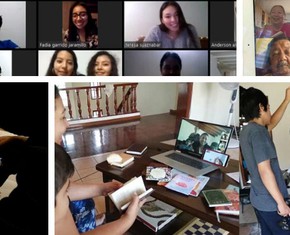The views expressed in our content reflect individual perspectives and do not represent the authoritative views of the Baha'i Faith.
The Baha’i writings often describe the prophets and messengers of God as “divine physicians,” sent by the Creator to minister to the ills afflicting humanity:
The Prophets of God should be regarded as physicians whose task is to foster the well-being of the world and its peoples, that, through the spirit of oneness, they may heal the sickness of a divided humanity. – Baha’u’llah, Gleanings from the Writings of Baha’u’llah, p. 80.
Earlier in this series we discussed that “sickness/cure” or “disease/remedy” metaphor to describe the role of those divine physicians.
We also introduced a framework of analysis in which all world religions are considered systems of salvation, liberation or harmony. Each religion offers us salvation, liberation or harmony in direct response to the current human predicament – the greatest single problem facing the world during any given day and age.
So, for instance, the human predicament, from the perspective of Western Christianity at least, has traditionally been defined as the universal problem of “sin.” Therefore it makes perfect sense that Christianity offers salvation from sin.
Another obvious example comes from early Buddhism, in which the Buddha, in his first sermon in Deer Park, stated that “All life is suffering.” So it also makes perfect sense that Buddhism offers liberation from suffering.
In the Baha’i context, the human predicament in modern life regards the world as suffering profound disunity, from family relations to international relations. Therefore, it also makes perfect sense that the Baha’i Faith offers individual and social salvation in the form of profound principles of unity, from family relations to international relations, as what one distinguished Baha’i, Ruhiyyih Khanum, called a “prescription for living.”
Consider this enigmatic statement from Baha’u’llah, which succinctly describes our contemporary human predicament from the Baha’i perspective:
No two men can be found who may be said to be outwardly and inwardly united. The evidences of discord and malice are apparent everywhere, though all were made for harmony and union. – Baha’u’llah, Tablets of Baha’u’llah, pp. 163–64.
The general tenor of this remarkable passage seems fairly obvious – as attorneys say, the document “speaks for itself.” Yet the first sentence is very interesting and, in its own way, quite dramatic in that it frames the universal problem of profound disunity in this day and age. That passage, especially in light of recent world events, should give us all pause for thought.
Years ago, when I first read Baha’u’llah’s sweeping statement, “No two men can be found who may be said to be outwardly and inwardly united,” I was astounded – and totally mystified! It seemed that few others had noticed this particular statement. It piqued my curiosity back then, and still does today.
Yes, I get the idea that the ‘’evidences of discord and malice are apparent everywhere.” Yet, to this very day, Baha’u’llah’s profound passage still confounds me. Here’s why: I would think that closely married couples, or “best friends,” might somehow qualify as “outwardly and inwardly united” — i.e. that such people may be considered to be “exceptions that prove the rule.” This does not seem to be the case, however.
I could be wrong, but Baha’u’llah’s statement appears to be more declarative than rhetorical. In other words, this very interesting assertion by Baha’u’llah should not be dismissed as hyperbolic — that is, an exaggeration in order to make a point.
One reason why I don’t think that Baha’u’llah exaggerates here is because the Baha’i writings also talk about unity in terms of “one soul” in passages such as these:
Regard man as a mine rich in gems of inestimable value. Education can, alone, cause it to reveal its treasures, and enable mankind to benefit therefrom. If any man were to meditate on that which the Scriptures, sent down from the heaven of God’s holy Will, have revealed, he would readily recognize that their purpose is that all men shall be regarded as one soul, so that the seal bearing the words ‘The Kingdom shall be God’s’ may be stamped on every heart, and the light of Divine bounty, of grace, and mercy may envelop all mankind. – Ibid., p. 162.
“As one soul” — what could that possibly mean? Obviously, it apparently indicates that harmony and concord should prevail among humanity. That understanding might apply better to expressions such as “kindred spirits,” “like-minded people,” and the like. But the phrase, “as one soul,” suggests a much deeper and more abiding sense of unity. Here’s another place where Baha’u’llah uses the phrase:
O Children of Men! Know ye not why We created you all from the same dust? That no one should exalt himself over the other. Ponder at all times in your hearts how ye were created. Since We have created you all from one same substance it is incumbent on you to be even as one soul, to walk with the same feet, eat with the same mouth and dwell in the same land, that from your inmost being, by your deeds and actions, the signs of oneness and the essence of detachment may be made manifest. Such is My counsel to you, O concourse of light! Heed ye this counsel that ye may obtain the fruit of holiness from the tree of wondrous glory. – The Hidden Words of Baha’u’llah, p. 20 (italics added).
So, by contrast, I’m trying understand that perplexing passage — “No two men can be found who may be said to be outwardly and inwardly united” — by virtue of its polar opposite, “even as one soul.” Here, my mind comprehends what my heart has never truly experienced. This may be because no one has ever truly experienced unity at quite the profound depth that the Baha’i writings describe – and prescribe.
The Baha’i writings teach many types of unity. In this “50 Baha’i Principles of Unity” series, I plan to write about those various types of unity – so I had to write this particular article first by way of a disclaimer, in order to let my readers know that I am not an authority on unity – far from it!
Rather, my research, as presented in this series, focuses on what the Baha’i writings have to say about unity. Speaking for myself, I have to meditate on each and every Baha’i principle of unity, and then figure out how to best apply that principle Baha’i principle to my own personal life.
In other words, I’m trying to practice what I preach, and preach what I’m trying to practice, although I am not a preacher, but simply another Baha’i trying to do his very best to understand what the Baha’i concepts, ethics and goals of unity really mean. In my own personal quest for unity, many questions remain, with more to come. I hope that exploring these questions will be of use to you, as they certainly have been to me.
Baha’u’llah underscored the importance of unity in this key passage:
O ye that dwell on earth! The distinguishing feature that marketh the preeminent character of this Supreme Revelation consisteth in that We have, on the one hand, blotted out from the pages of God’s holy Book whatsoever hath been the cause of strife, of malice and mischief amongst the children of men, and have, on the other, laid down the essential prerequisites of concord, of understanding, of complete and enduring unity. Well is it with them that keep My statutes. – Gleanings from the Writings of Baha’u’llah, p. 97.
The Baha’i Faith offers individual and social salvation from the human predicament of profound disunity, from family relations to international relations. To rid ourselves of this all-pervasive disunity, which news headlines across the world report each day, the Baha’i teachings prescribe, guide and inspire humanity with new and effective ways to love one another, live in harmony and come together in unity — from family relations to international relations. This series will continue to explore each of these 50 Baha’i principles on unity, one by one. Stay tuned!
















Comments
Sign in or create an account
Continue with Googleor